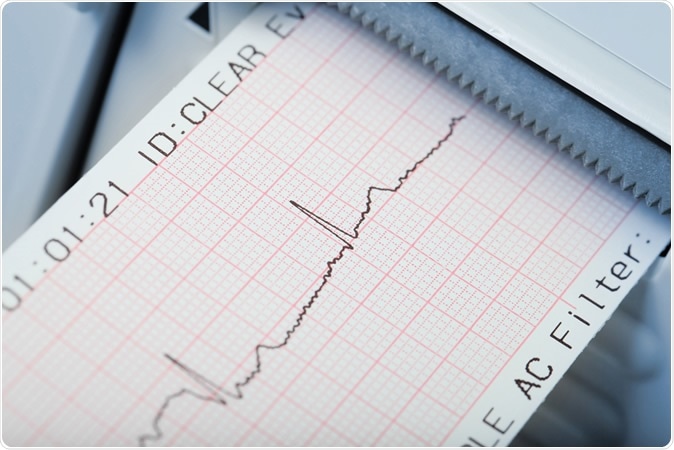At the ESC Congress 2019 held in Paris last weekend, the European Society of Cardiology (ESC) Guidelines on supraventricular tachycardia were published. The document titled, “2019 ESC Guidelines for the management of patients with supraventricular tachycardia.
The Task Force for the management of patients with supraventricular tachycardia of the European Society of Cardiology (ESC): Developed in collaboration with the Association for European Paediatric and Congenital Cardiology (AEPC),” appeared online in the European Heart Journal at the ESC website. The authors write that these guidelines, “summarize and evaluate available evidence with the aim of assisting health professionals in proposing the best management strategies for an individual patient with a given condition.”

Image Credit: Sfam_photo / Shutterstock
The document states that Supraventricular tachycardia (SVT) is a condition where the heart rate is over 100 beats per minute (exceeding the normal of around 70 to 90 beats per minute). SVT results due to impaired impulse generation and transmissions via the nerves of the heart that maintains the normal heart rhythm. Around 0.2 percent of the population is diagnosed with SVT, making it one of the common forms of cardiac arrhythmias. Age is one of the largest risk factors in development of SVT with those over 65 years being at a five times greater risk. Women are also doubly at risk of SVT compared to men. The tachycardia or fast heart rate usually begins at the atrium or the smaller chambers of the heart and does not cross over to the ventricles. The SVT usually starts and stops abruptly. The authors of the guidelines state the SVT is not life threatening unlike ventricular tachycardia. However, if left untreated, SVT could raise the risk of getting heart attacks and strokes. In addition the patients may suffer from debilitating symptoms such as palpitations, chest pain, shortness of breath, black outs, vertigo etc.
Last guidelines for treatment of SVT were published in 2003. The team wrote, “The ESC published management Guidelines for supraventricular tachycardias (SVTs) in 2003; corresponding US guidelines have also been published, the most recent being in 2015.” In these 2019 guidelines, the drug therapy for SVT has not changed significantly. Catheter ablation however has been included in the treatment modality. The guidelines also mention the management of SVT in pregnant women because in them the presence of SVT is fraught with risks to the mother as well as the baby.
Professor Josep Brugada, Chairperson of the guidelines Task Force and professor of medicine, University of Barcelona, Spain, said, “We do have more data on the potential benefits and risks associated with several drugs, and we know how to use them in a safer way. In addition, some new antiarrhythmic drugs are available.” He added that use of these drugs are associated with lowering of their effectiveness and increase in side effects.
The authors of the guidelines wrote, “Owing to the fact that the previous Guidelines on SVT were published 16 years ago, many drugs that were recommended at that time are not considered in the 2019 Guidelines. In addition, techniques and indications of ablation techniques have changed.” The team writes that the main alteration in the new guidelines is the inclusion of the newly available medications and approaches to treating SVT. Catheter ablation for example is a new development over the past 16 years. The method is used to freeze the affected region of the heart tissues and thus prevent the arrhythmias from originating.
The guidelines:
- Drug therapy for inappropriate sinus tachycardia and focal atrial tachycardia.
- Therapeutic options for acute conversion and anticoagulation of atrial flutter.
- Therapy of atrioventricular nodal re-entrant tachycardia.
- Therapy of antidromic atrioventricular re-entrant tachycardia and pre-excited atrial fibrillation.
- Management of patients with asymptomatic pre-excitation.
- Diagnosis and therapy of tachycardiomyopathy.
Professor Demosthenes Katritsis, Chairperson of the guidelines Task Force and director of the 3rd Cardiology Department, Hygeia Hospital, Athens, Greece, in a statement said, “Catheter ablation techniques and technology have evolved in a way that we can now offer this treatment modality to most of our patients with SVT.”
Regarding management of SVT in pregnant women, Prof Katritsis said that all antiarrythmic drugs should be avoided in them especially in the first trimester. He added, “Pregnant women with persistent arrhythmias that do not respond to drugs, or for whom drug therapy is contraindicated or not desirable, can now be treated with catheter ablation using new techniques that avoid exposing themselves or their baby to harmful levels of radiation.”
Prof Brugada concluded that all persons experiencing palpitations and symptoms of SVT should seek medical help. He said, “Always seek medical help and advice if you have a fast heartbeat. If SVT is suspected, you should undergo electrophysiology studies with a view to catheter ablation, since several of the underlying conditions may have serious long-term side effects and inadvertently affect your wellbeing. Prevention of recurrences depends on the particular type of SVT, so ask your doctor for advice. Catheter ablation is safe and cures most SVTs.”
Journal reference:
Josep Brugada, Demosthenes G Katritsis, Elena Arbelo, Fernando Arribas, Jeroen J Bax, Carina Blomström-Lundqvist, Hugh Calkins, Domenico Corrado, Spyridon G Deftereos, Gerhard-Paul Diller, Juan J Gomez-Doblas, Bulent Gorenek, Andrew Grace, Siew Yen Ho, Juan-Carlos Kaski, Karl-Heinz Kuck, Pier David Lambiase, Frederic Sacher, Georgia Sarquella-Brugada, Piotr Suwalski, Antonio Zaza, ESC Scientific Document Group, 2019 ESC Guidelines for the management of patients with supraventricular tachycardia The Task Force for the management of patients with supraventricular tachycardia of the European Society of Cardiology (ESC): Developed in collaboration with the Association for European Paediatric and Congenital Cardiology (AEPC), European Heart Journal, , ehz467, https://doi.org/10.1093/eurheartj/ehz467